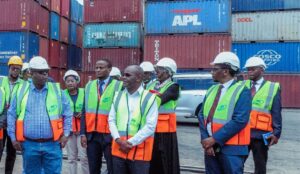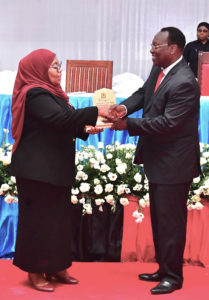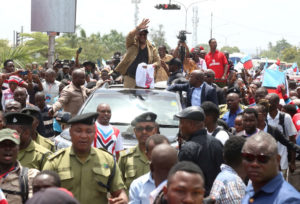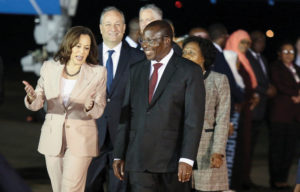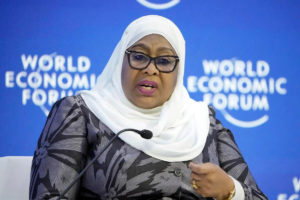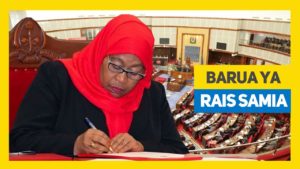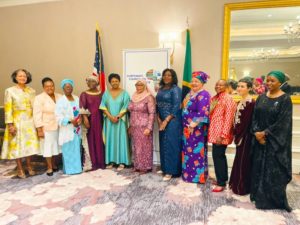by Ben Taylor
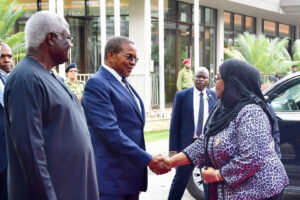
President Samia greets former president Jakaya Kikwete and Sierra Leone’s Ernest Bai Koroma (L) – photo State House
Power games within CCM continue as 2025 approaches
It has long been the case in Tanzanian politics that power struggles within the ruling party, CCM, have had more significance than disputes that pit CCM against opposition parties. Such has been the dominance of CCM that manoeuvres to seize and maintain control of the party are where the real focus of the country’s politics lies.
This is where the pre-2015 struggle between former prime minister, Edward Lowassa, and Bernard Membe primarily played out, though both ended up running for President for opposition parties after party elders brought forward John Magufuli as something of a compromise candidate.
The significance of that choice only became clear well into President Magufuli’s term in office as President. And it continues to cause repercussions to this day, with his Vice President, the current President Samia Suluhu Hassan working hard to maintain her control of a party that remains filled with divisions over matters of policy, personality and power.
Having never truly been chosen for the role by either party members or the national electorate, President Samia’s starting point was weaker than previous new party leaders. She is also dealing with the aftermath of the divisive presidency of her predecessor, who was extremely popular with many – both in the party and the wider country – for taking on corruption and “neo-colonialist” investors, and yet also drew extensive criticism for his approach, variously described by critics as “draconian”, “populist”, “anti-democratic”, and “economically illiterate”.
There are those within the party – including some at high levels – for whom a continuation of Magufuli’s style is the best way forward for some combination of the party, the country and their own interests. And there are others – again including some at high levels – who would prefer to see a return to the business-friendly (and perhaps corruption-friendly) approach of Presidents Mkapa and Kikwete.
The challenge President Samia faces is to consolidate her position as party chair, ensure she faces no serious opposition within the party for nomination as the CCM presidential candidate in 2025, while keeping the various party factions happy as they wait to pounce either on any weakness she may show between now and 2025, or, failing that, in the lead-up to 2030 when President Samia will not be eligible for another term.
Many of President Samia’s early moves as President were to gradually roll-back the most egregious anti-democratic measures introduced by President Magufuli – such as restrictions on the media and on opposition party gatherings. The pace of this change has noticeably slowed in recent months, however.
In the previous issue of TA (No. 136), it was reported how her response to criticisms of the involvement of DP World in managing the port in Dar es Salaam showed some Magufuli-like instincts, clamping down hard on critics (See below for an update on that situation).
More recently, she has appointed a key ally of President Magufuli, Paul Makonda, to the influential position of CCM’s Secretary of Ideology and Politics Publicity – a position that represents the party to the public as much as any other besides the President.
Some observers see Makonda’s appointment as a means to gain confidence among party members who were big supporters of the former President, including those from his stronghold in the northwest of the country. Others have pointed out that the appointment contradicts the reformist and reconciliatory ideals that the President has been claiming since she assumed the presidency in March 2021. Tundu Lissu, CHADEMA’s deputy national chairperson (Tanzania Mainland), has described Makonda’s appointment as a sign of the “coming dark and painful days of politicking.”
Further, in November 2023, the CCM Secretary-General, Daniel Chongolo, requested to step down after being “defamed” online, amid allegations of sexual impropriety. The specifics of the case are unclear, but some have argued that he had been targeted by others in the party who were keen to remove him from his position.
[STOP PRESS: Shortly before going to press, it was announced that the new Secretary General of CCM will be Emmanuel Nchimbi. Mr Nchimbi is a former Minister of Home Affairs (2012-2013) and more recently has been Tanzania’s Ambassador to Brazil between 2016 and 2021 and Egypt since 2022.]
In this context, it is worth reflecting on the words of former President Jakaya Kikwete at CCM’s national congress meeting in December, 2022. His words are outwardly reassuring, but also bear an implicit warning: “Don’t listen to people’s rumours that there is this young man who will run, or this old man will run. It’s pure nonsense,” he said. “I’m not saying I’m stopping them, but I don’t see any member of CCM who will take the form to oppose you in 2025. Maybe if things become too much worse between now and then. But I don’t believe that will happen, and it’s not our tradition.”
New election legislation presented to Parliament
A collection of bills were presented to Parliament for their first reading late in 2023, with a view to introducing some changes to how elections are run. Specifically, this includes a new Elections Bill, which is set to replace the Elections Act of 1985 and the Local Government Elections Act of 1979; a National Electoral Commission Bill, establishing the basis on which the commission should be governed; and a bill proposing amendments to the Election Expenses Act, Political Parties Act.
As soon as the bills became public, they created some controversy, largely for not including various provisions that had been expected. Indeed, the majority of what is included in the bills is minor: making small clarifications and corrections to existing laws, or consolidating them, and/or part of the country’s gradual shift from the use of English to Swahili in its legislation.
Critics of the new laws pointed out, however, that there is nothing to substantively change the independence – or lack of independence – of the National Electoral Commission (NEC) or the Office of the Registrar of Political Parties (ORPP), which had been widely called for. Nor is anything proposed that would allow for independent candidates. And nor do the proposals address the long-recognised problem of local government employees, dependent on senior ruling party politicians for their career prospects, taking the role of local election coordinators (returning officers). It has been widely reported that in 2020 the then President John Magufuli said he would have serious questions for any council director who received vehicles, housing and their salary from the President and yet went on to announce an opposition candidate as the victor.
There are legal concerns as well. The use of local government employees and the constitutional block on independent candidates have both been determined by the African Court of Human and People’s Rights (ACHPR) to represent a denial of citizens’ rights. The court has directed the government to take appropriate steps to change the law and/or the constitution.
Earlier, a meeting convened in August 2023 by the Tanzania Centre for Democracy (TCD), an organisation whose members are Tanzania’s political parties, including CCM, had concluded that it was too late to introduce major changes to the national Constitution before the elections in 2025. Instead, they had recommended some minor changes that would include provisions to establish a truly independent electoral commission and to allow for independent candidates.
The new bills strongly suggest that the government has no plans to introduce the changes either as recommended by the TCD or as directed by the African Court.
The Catholic Bishops Conference was among those concerned by the lack of changes in the proposed new laws. The bishops pointed out that relying on public servants as returning officers is discriminatory and unconstitutional, and also recommended for an independent body to appoint members of the electoral commission instead of the President, and proposed a separate budget for the national election.
Dr. Anna Henga, Executive Director of the Legal and Human Rights Centre, and NGO, proposed that “the commission should be given the power to hire its own staff at ward, district, regional, and national levels,” rather than relying on local government employees.
Speaking on behalf of CCM, the party’s new Secretary of Ideology and Publicity, Paul Makonda, came out in defence of the proposed laws. He said that the exercise has largely considered recommendations from stakeholders. It was unfortunate, he added, that criticisms of the bills were coming from those, such as Chadema party chairperson Freeman Mbowe and his party, who had been major beneficiaries of the ongoing political reconciliation under President Samia Suluhu Hassan.
Government proceeds with DP World port deal despite controversy
President Samia Suluhu Hassan in October 2023 witnessed the signing of three investment and operation contracts with the Dubai-based logistics company DP World, having decided to proceed with the controversial partnership despite heavy criticism.
The ceremony occurred at Chamwino State House in Dodoma after lawmakers approved the controversial Tanzania-Dubai intergovernmental agreement that would see DP World take over some operations at the Dar es Salaam port.
The government has hailed the deal as a “game-changer,” arguing that it will help Tanzania achieve its ambitions of becoming a major regional logistical hub. However, critics including thirty-seven Catholic Bishops argue that the benefits are exaggerated, with some saying that the deal is effectively “selling off” the country. Public debate around the issue had become highly politicised, including heavy-handed policing of critics (see previous issue of TA).
The signed contracts include the Host Government Agreement (HGA), the lease and operation of berths 4-7 and the joint operation of berths 0-3 between Tanzania Ports Authority (TPA) and DP World for commercial and governmental activities. Few details of the contracts have been publicly released.
After witnessing the signing of the contracts, President Samia said the government had considered proposals shared by stakeholders on the intergovernmental agreement, which include the Tanganyika Law Society (TLS), political parties, civil societies, activists and the press. “We listened to our religious leaders, and even our former leaders,” the Head of State noted. “I can confidently say that there is no group or voice that was ignored.”
She explained that the government had appointed a team of experts, which also included politicians and lawyers, who went through all the comments made regarding the deal, which ultimately advised which should be considered and which were baseless and could be ignored.
“This task was superbly done and contributed immensely to the negotiating team,” President Samia said.
Speaking during the signing ceremony, TPA Director General Plasduce Mbossa said the contract between the government and DP World will last 30 years, and DP World’s performance will be evaluated every five years.
This at least partly answers one of the biggest criticisms of the original agreement with DP World – that it had no end-date and might thus commit Tanzania to partnership with the firm beyond the country’s best interests.
“After signing these agreements, the government will be able to keep more than 60 per cent of all revenue as all operating costs will be borne by DP World,” Mr Mbossa said. He explained that custom duties collected by the Tanzania Revenue Authority (TRA) will be based on the number of serviced ships, leading to a significant increase in revenue as more ships will be serviced. “We expect that revenue collected by TRA at the port will increase from the current TSh7.8 trillion in 2021/22 to TSh26 trillion by 2032,” Mr Mbossa explained (from GBP £2.4bn to £8bn.)
He pointed out that the contracts do not involve all port operations in Dar es Salaam or all other Tanzanian ports, revealing that TPA has already begun finding an operator for berths 8-11, and that security at the port would remain the government’s responsibility.
The chairman and chief executive of DP World, Sultan Ahmed bin Sulayem, described the signing of the three contracts as a “significant step” in his company’s commitment to Tanzania. “Over the next five years,” he said, “DP World will invest in excess of US$250 million to upgrade the port.”
“We’ll strengthen the port’s role as a maritime gateway for the copper belt and other important green energy mineral territories,” he added. “We’ll also do this with a multi-phase plan that will also focus on improving transport and logistic services throughout Tanzania and into the hinterland.”

